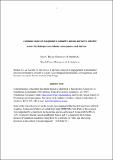A dynamic model of engagement in normative and non-normative collective action : psychological antecedents, consequences, and barriers
Abstract
This review addresses three recent developments in the collective action literature. First, we demonstrate that normative and non-normative collective action participation can be predicted by different psychological variables. Second, we show that collective action participation has emotional and identity-related consequences for activists that shape their motivation to engage in future action. Third, we illustrate that members of disadvantaged groups are faced with two dilemmas: the dilemma of alternative ways of identity management and the dilemma of affective loyalties towards the outgroup, both of which present barriers to social change by undermining protest intentions. In the final part of the review, we outline an integrative framework that maps out the dynamic processes between antecedents of, barriers to and outcomes of collective action participation and highlight a number of directions for future research.
Citation
Becker , J & Tausch , N 2015 , ' A dynamic model of engagement in normative and non-normative collective action : psychological antecedents, consequences, and barriers ' , European Review of Social Psychology , vol. 26 , no. 1 , pp. 43-92 . https://doi.org/10.1080/10463283.2015.1094265
Publication
European Review of Social Psychology
Status
Peer reviewed
ISSN
1479-277XType
Journal article
Description
Some of the research reported in this review was prepared while Nicole Tausch was a British Academy Postdoctoral Fellow at Cardiff University (PDF/2007/520). Parts of this research were supported by a grant from the Economic and Social Research Council (RES-000-22-3251) awarded to Nicole Tausch and Russell Spears and by a grant from the German Research Foundation awarded to Jenny Roth for a network on “intra- and intergroup processes in the context of social inequality” (RO 4826/1-1).Collections
Items in the St Andrews Research Repository are protected by copyright, with all rights reserved, unless otherwise indicated.

